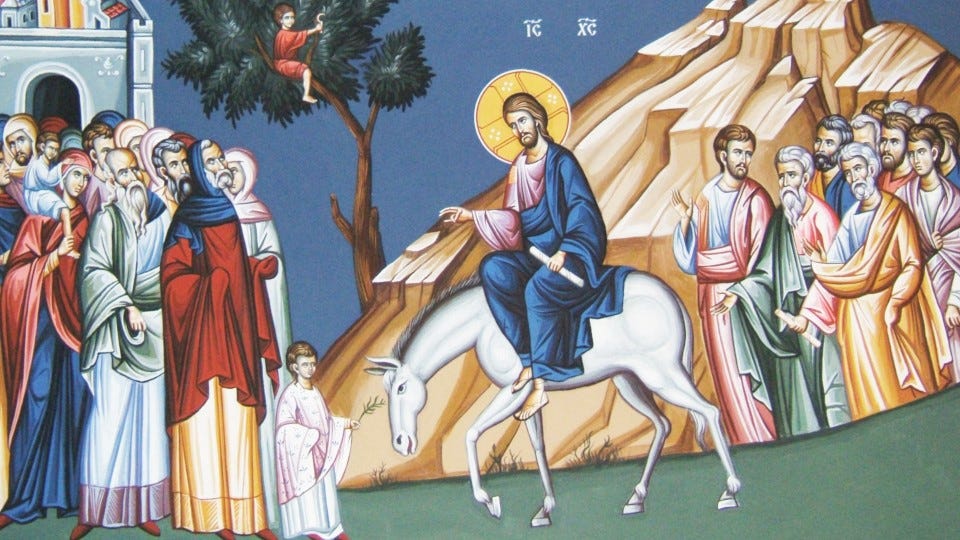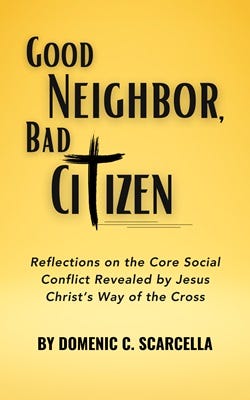Trump, Taylor Swift, Ned Flanders & Fredo
A Podcast on History & Holy Week, with Some Modern Pop-Culture References
If you enjoy this article, please click Like (❤️) to help others find my work.

So you’re saying Donald Trump is God’s son [like Jesus]?
Bob Murphy got a laugh out of me with that question. “Not quite,” I replied.
Yes, we’re all children of God in one sense. But none of us, including the president of the U.S., is the Messiah. There’s only one Jesus Christ of human history.
And Bob, Adam Haman and I spent a little over an hour discussing the historical aspects of Jesus’ final few days. Christians recall these events in a special, deeper way during what’s known as Holy Week or Passion Week (Apr. 13-19 this year), which leads to Easter/Paschal Sunday (Apr. 20 this year).
I appeared on both Adam’s “Haman Nature” and Bob’s “The Bob Murphy Show” individually last year to discuss my book, Good Neighbor, Bad Citizen. Our latest conversation occurred for a crossover podcast, in which Adam and Bob collaborate and on an episode that they each release to their respective audiences.
Listen at:
Haman Nature — right here on SUBSTACK!!! … YouTube … X/Twitter
The Bob Murphy Show — Spotify … YouTube … The Bob Murphy Show website
Though each is an advocate for human freedom, Adam and Bob have plenty not in common.
Adam is a street-smart professional poker player and coach. Bob is a book-smart Ph.D. economist and author.
Adam is an atheist/agnostic in the humanist mold. Bob is a reformed Christian.
Their dynamic demonstrates an important aspect of genuine anarchism/voluntarism: People with different personalities, abilities, backgrounds, beliefs, and traditions can all be honest practitioners and advocates for freedom and human dignity.
Good neighbors have many flavors.
So, how did Donald Trump enter the fray?
Since the goal of the conversation was less about theology and more about human psychology and anthropology — how humans behave in critical social settings — it made sense to draw rough comparisons to modern culture.
Jesus’ final trip to Jerusalem nearly 2,000 years ago began with some very public support (or, at least, curious optimism), but had significantly shifted a few days later during His public sentencing.
It reminded me of how so many people swung their opinions wildly during the COVID debacle, especially in 2020, depending on what their favorite high-status person on TV told them. For instance, many Democrat leaders and Dem-leaning folks spoke against the “Trump vaccine,” until Democrats won the presidency and tried to mandate the ridiculous gene-therapy injections.
As Adam noted:
I think that’s a function of our species. We are very hierarchical, and part of what got us here is we trust people that are above us. For good or for ill, we’re sort of hardwired [for this type of behavior].
More contemporary connections followed.
In describing how Jesus riled up the crowds in the Temple (the religious and political heart of the city), I noted that the Israelite leaders wanted to arrest Jesus but were afraid of the crowds (Matthew 21:46, Mark 11:18, Luke 19:47-48).

I asked Adam and Bob to imagine the incident from Jan. 6, 2021, when members of the public filled the grounds of the U.S. “Temple” (the Capitol building). Though the federal overlords wanted to arrest people, they cowered in fear of the crowds.
This prompted Bob’s humorous rhetorical question quoted in the opening sentence. Obviously, the similarities between cowardly leaders and excitable crowds doesn’t mean the analogy holds for then-outgoing president Donald Trump (who riled up the 2021 crowds) being a Christ figure.
Trump worships government, like the rest of the politicians who hid in fear. And Trump avoided the Capitol crowds on Jan. 6.
Jesus, the opposite of a government worshiper, was right there in the Temple, facing and engaging vigorously, but nonviolently, with friend and foe alike.
Haters gonna hate?
This reality of Jesus disrupting people’s comfortable-but-corrupt order with His words and actions may seem strange to folks who, like Bob, grew up with an image of Jesus that Bob described as resembling happy-go-lucky, non-confrontational “nice guy” Ned Flanders from “The Simpsons.”
I distinguished between “nice” and “kind”:
Jesus is kind, but he’s not really a nice guy. Nice is when you do things to elicit favorable reactions from people. Nice is someone else’s opinion of you. Kind is more of, you treat a person in a way that respects their dignity.
…
Jesus is just trying to be as true as possible. And people react to Him all sorts of ways, which reveals, really, their hearts.

Unsurprisingly, a deep discussion of the history recorded in the canonical Gospels led to some questions about the centuries of Christian culture that followed. When did the Church turn away from the obvious anarchism, nonviolence, and dignity-exalting good neighborliness of the New Testament era?
Sadly, most of Christian history features the poisonous infiltration of coercive civil authority. Opportunistic figures in governments, beginning with the Roman Emperor Constantine (early 4th Century A.D.), sought to co-opt the popularity and symbolism of Christianity. Similarly opportunistic figures in the Church welcomed this unholy union.
As Adam quipped about government, all the way up to the present:
They co-opted Taylor Swift; they can co-opt anything!
You can hear my song-inspired response on the podcast; I won’t spoil it for those who want to be surprised.
And what about Fredo Corleone from The Godfather and The Godfather II movies? We’ll save some commentary on that part of the podcast for next week’s article …
Dive into the Comments
Until this time, I’d never appeared on a crossover episode, featuring hosts of two shows doing a collaboration. How did I mesh with Adam and Bob?
Do you have any customs you like to keep during Holy Week? Do you find yourself drawn to any aspects of the more detailed recollection of events, afforded by the week’s celebrations?
What do you think of my attempts to connect the human behaviors and reactions of Jesus’ time/place to the present day?
Anything else stand out to you about the podcast discussion, or this article recapping some of the points?
Let me know your thoughts below …
—
Want some extra spiritual reading for the upcoming Holy Week? I offer for your consideration my book, Good Neighbor, Bad Citizen, available at:
Amazon (paperback & Kindle)
Barnes&Noble (paperback)
Lulu (paperback)
Find me on X: GoodNeighBadCit
And, as always: Be a good neighbor, even if it makes you a bad citizen.





